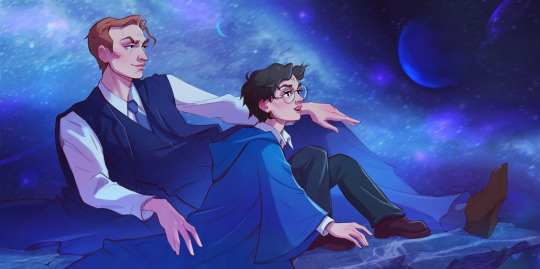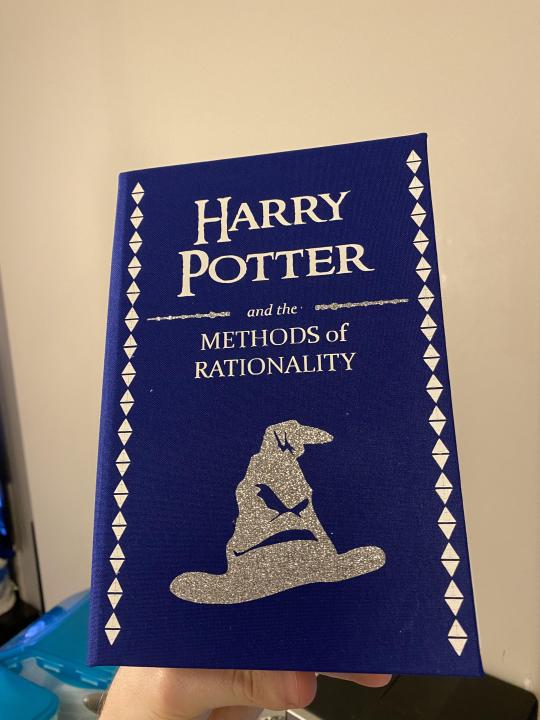#harry potter and methods of rationality
Explore tagged Tumblr posts
Text

Trust Eliezer Yudkowsky to make science sound dirty (this moment was preceded by a morality lesson on how nobody is genetically programmed to know why killing people is bad btw. Just uh. Thought i should say that)
#hp fandom#harry potter#harry potter and methods of rationality#hpmor#harry potter fanfiction#eliezer yudkowsky
33 notes
·
View notes
Text
Fanwork Friday: Harry Potter and the Methods of Rationality

This week’s Fanwork Friday is Harry Potter and the Methods of Rationality (also known as HPMOR), a well-known but controversial Harry Potter fanfiction written by Eliezer Yudkowsky which reimagines the plot of the first book through the lens of science and rationality. HPMOR was incredibly popular, with parts of the story translated into 15 languages, and even spawning its own recursive fanworks!
The fanfic also prompted a wide variety of fan responses: for example, it was was often referenced by those outside fannish spaces and praised as an example of the way fanfiction could build on the world of a canon. However, other fans looked much more critically at the story, considering it to be exploiting fandom to promote Yudkowsky’s “rationalist” philosophies and professional work.
If you’re interested in learning more about the fanfic and the many discussions around it, you can read about it on Fanlore!
------
Fanlore does not support or condone the views expressed by J.K. Rowling. We wish only to highlight the transformative nature of fandom and the creativity of fans.
------
We value every contribution to our shared fandom history. If you’re new to editing Fanlore or wikis in general, visit our New Visitor Portal to get started or ask us questions here!
#fanlore#Fanwork Friday#Harry Potter and the Methods of Rationality#HPMOR#Harry Potter#Harry Potter Fanfiction#Fandom History#graphic by Amyl#text by Castille
67 notes
·
View notes
Text
A friendly reminder that the joint Worm Fandom+Rationalism movement has killed over 38,615 people, exactly one of whom was a landlord. This is genuinely the most evil force in the world today. A dangerous cult movement is rapidly gaining control of both American youth culture and the U.S. government.
#wormblr#worm web serial#worm#worm fandom#hpmor#Harry potter and the methods of rationality#methods of rationality#elon musk#andrew yang#jd vance#zizians#ziz#scott Alexander#eliezer yudkowsky#pepfar#musk and usaid#usaid funding freeze#usaid#us aid#pmi#us politics#slate star codex#rationality#rational thinking#rationalism#rational#richard hanania#matthew yglesias#wildbow#rokos basilisk
122 notes
·
View notes
Text

Illustration for the amazing story Harry Potter and the Methods of Rationality
#hpmor#hp fanfiction#harry potter and the methods of rationality#hpmor fanart#harry potter fanart#harry potter#quirinus quirrell#professor quirrell#Harry James Potter-Evans-Verres#fanart#digital art#artists on tumblr#illustration#tayskitter art#yudkowsky#eliezer yudkowsky
54 notes
·
View notes
Text

Stuck in the hpmor rabbit hole
#hpmor#harry potter and the methods of rationality#harry potter#art#my art#digital art#artwork#fan art#fanart#ravenclaw#headcanon
95 notes
·
View notes
Text
Recently I got recommended a lot of videos criticizing Harry Potter and no videos talking about how great Harry Potter and the Methods of Rationality is instead. Like, if you want a better version of the story, just read this fanfiction by Eliezer Yudkowsky.
In his AU:
-Harry gets adopted by Petunia and an Oxford professor and is homeschooled in science
-When he gets into the wizarding world he is irritated by the society’s bigotry and backwardness and wants to change the world by fusing magic and science
-He is accepted into Ravenclaw and so is Hermione
-He befriends Draco instead of Ron and slowly makes him question his beliefs and actually become a better person
-Hermione has a lot of screen time and her own arcs including the one where she fights against misogyny in heroism
-there’s a homestuck reference
-there’s a death note reference
-at some point Harry bullies the sorting hat
-Voldemort (or rather his actual identity) is a well-written character with interesting backstory and goals
- the plot point where Harry is Voldemort’s horcrux plays a big role in this
-at some point Voldemort uses a gun
-there’s a scientific explanation to how spirits and patronus work
-there’s an mlp reference
-one of the hocruxes is in space
-the Philosopher’s stone is canonically created by two lesbians and one of them is baba yaga
#harry potter#harry potter and the methods of rationality#hpmor#I liked harry potter as a child but I think rereading it now would give me brain damage
56 notes
·
View notes
Text
Hmm, something went awry, here.

(Art by talespirit)
#twewy#twewy spoilers#the world ends with you#harry potter and the methods of rationality#harry potter#hpmor#harry james potter-evans-verres#fanfic#tumblr polls#couldtheysurviveshibuya#i think i selected the wrong harry potter by mistake???#oh well this one might have more fun results
16 notes
·
View notes
Text
back when i was like 11 i came across roko's basilisk for the first time (memory says i was like 11 and it was on neopets but i could have been 15 and on tumblr), anyway i definitely recall that my reaction to reading about this god-ai was to make a promise that, if i ever got into computing, then sure, i wouldn't get in the way of anyone trying to make a god-ai
and then i went back to playing turmac roll or whatever
and now i get to learn about how a whole bunch of very online people broke one another on a fundamental level by getting really wrapped up in the whole idea to the point that they kinda forgot how to function?
and i definitely could have ended up following that kind of path the same way i almost fell down the gamergate pipeline or one of the other weird Very Online pipelines that end with people fundamentally broken in a very particular way
and i'm very glad i didn't
#behind the bastards#rationalism#roko's basilisk#i also definitely read the first few chapters of Harry Potter and the Methods of Rationality around the same time#and at the time i thought it was just going over my head the way some books did#(when the language is technically within your grasp but the context and concepts are not)#but in retrospect it was very badly written and i dodged a cannonball
20 notes
·
View notes
Text

hmm i dont remember that part
#i just remembered about harry potter and the methods of rationality. reading the wikipedia summary for that is a trip lmao#harry potter if voldemort had a glock:
13 notes
·
View notes
Text
Okay so.... Does anyone else find themselves caring deeply about the hpmor marauders? Because it feels to me like they have a ton of potential. Just in terms of fanfiction
Like, think about it that way: Remus is basically the same as in the original. James was unambiguously confirmed to have been a dick as a teenager who's gotten better over time. Peter now has a FUCKTON more potential, since he was a secret metamorphemagus, canonically queer, and a SPY FOR THE LIGHT SIDE, who then spent a decade in Azkaban, GOT OUT, and rebuilt his life (presumably with Remus's help). Think of all the potential for angst! I even wrote a fic about it! (Will give the link to anyone who wants it) And Sirius was, yes, evil, but also canonically queer, and there's so much amazing stuff you could do with a teen Gryffindor dark wizard who is kinda friends with a group of bullies who want to believe he's better than his family, aka maybe an asshole, but not ACTUALLY EVIL, and can't pick up on the signs until it's too late, and who- okay, just imagine in the hpmor marauders era, hpmor Sirius manipulating hpmor Peter, who was his BOYFRIEND, who wanted to believe the best about him, who was drawn by his charisma and his charm, and the relationship slowly turning truly horrible, too slowly for Peter to be able to notice what's going on and leave, until it all blows up in everyone's face- what was the big disaster that ended it all? It's for you to decide! And that's not even talking about how hpmor Snape was just everything the fandom wanted canon Snape to be- a dark and edgy and clever and lonely asocial guy who wanted to fit in with the cool dark wizard as a teen, but who still had enough of a true moral compass to truly understand the error of his ways and really try to make amends to the world he almost destroyed, WHICH MADE HIM ALL THE MORE VULNERABLE TO MANIPULATION BY DUMBLEDORE WHO WANTED TO USE HIS GUILT TO PULL HIS STRINGS- why is no one talking about this? This is perfect fandom material!
... Okay. I'm calm now. I'm normal about this.
If you have any, by which I mean ANY hpmor marauders fanfic requests, give them to me and I'll see what I can do.
29 notes
·
View notes
Text
You just do not read Harry Potter and the methods of rationality before sleep, you just don't do it. What was i thinking, hoping that I would stop reading and go to bed like a good girl after just two hours; i should've known I'd be consumed, numb for the world but that of Eliezer Yudkowsky making.
Ever heard the stories of souls being trapped in digital machines? That's me and my kindle after 89th chapter. Don't send help, I'm long gone (like Hermione Granger is)
48 notes
·
View notes
Text


Decided to get into book binding over the holidays. Here's my first attempt at doing an actual custom hardcover book (I did do a super low effort softcover rebind first to get familiar with the process).
Excited to try some new techniques for the next couple.
13 notes
·
View notes
Note
If Voldemort lived at the end of DH (say theres one or however many Horcruxes they missed because they never actually knew the real number) what do you think would happen? Would he wait longer to return? Just give up? Or if he survived by again latching onto Harry, so it's something only he knows. Do you think he'd just take it to the grave?
If there had been a last, unidentified horcrux hanging around at the end of Deathly Hallows? I think it would have just been a Book 1 reset, Voldemort would have become "less than spirit, less than the meanest ghost." But still with the power to possess people, so still dangerous *enough.*
Harry Potter and the Methods of Rationality (spoilers) kinda gets into this question by making one of Voldemort's horcruxes something that *can't* reasonably be destroyed (the Voyager Plaque.) And so because actually destroying Voldemort's main body would actually cause more problems, little Ender Wiggen!Harry has to find some workarounds.
13 notes
·
View notes
Text

A stunning artwork by artist Anastasiia Ivanova. And while Professor Quirrell doesn’t wear a turban in Harry Potter and the Methods of Rationality, I think the atmosphere and mood of his character are captured perfectly. I'm really glad I found this art 💜
#professor quirrell#quirinus quirrell#harry potter fanart#harry potter and the methods of rationality#hpmor fanart#hpmor#hp fanfiction#digital art#character design#yudkowsky#eliezer yudkowsky
36 notes
·
View notes
Text
So I was listening to this podcast called Hard Fork (recommended to me by one of my professors. I'm an Interactive Media student) and everything's going as usual, until the guest on the podcast this week mentions being a "rationalist" and I'm like "huh isn't that what the guy who wrote Harry Potter and The Methods of Rationality is?" mind you this is only 2 weeks after @strange-aeons posted her video on that fic. (I was familiar with it already one of my friends told me about it).
So I keep listening AND HE MENTIONS ELIEZER YUDKOWSKY BY NAME and I'm just like "oh my god. it's all connected. help-" just GOBSMACKED
So yeah that's why I almost ran a red light on my drive home from class today!
#i promise im not a tech bro#i want to work in UX research or analytics#it was just so wild to have him be mentioned in something i listen to to keep up with tech news#strange aeons#Harry Potter and the Methods of Rationality#eliezer yudkowsky#harry potter fanfiction#fanfiction history
3 notes
·
View notes
Text
do you think cults still write fanfiction as a recruitment tool, or was that just the harry potter fandom
#look up dumbledore's army and the year of darkness + harry potter and the methods of rationality for a bad time!#also snapewives
21 notes
·
View notes